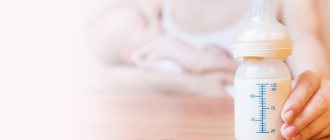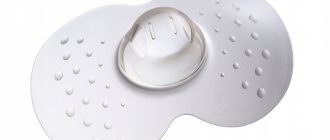GV. Pros for the baby:
- breast milk has optimal composition;
- adapts to the individual needs of the baby;
- easier to digest and assimilate;
- promotes the proliferation of beneficial bacteria in the intestines;
- provides passive immunity;
- contains growth factors that ensure the maturation of the nervous, immune, and digestive systems;
- promotes the formation of a strong emotional connection with the mother.
Numerous studies demonstrate that breast-fed children get sick less often and, accordingly, die less often in infancy, are ahead of artificially-fed children in intellectual development and have a more stable nervous system. There is also evidence that as adults, children who have been exposed to breast milk for a long time have fewer chronic diseases and are more likely to live longer.
Photo source: shutterstock.com
Disadvantages of breastfeeding - are there any?
Yes, yes, you were not mistaken, I would like to talk about what many call the disadvantages of breastfeeding . There is a lot of talk about the benefits of breastfeeding, many doctors are already in favor of breastfeeding, as they say, obeying “general trends,” and society as a whole is very loyal. However, in their comments, mothers of “breastfed” children very often (and sometimes quite angrily) contrast themselves with “Breastfeeding mothers” and oppose the ideas of natural parenthood (feeding on demand, long-term breastfeeding, co-sleeping, etc.). At the same time, we must understand that today the majority of mothers are “artificial”, despite all the “propaganda” of breastfeeding.
For example, here is a very illustrative case - a young mother is sure that she fought for breastfeeding until the last moment, but at 2.5 months the child had to be switched to formula for objective reasons. Although there was pumping “as much as I could, 5-10 grams each, the whole breast was covered in bruises and stretch marks, the child could only tolerate buckwheat and pasta from food, I couldn’t hang the baby on my chest for 24 hours, he was too weak and lay separately, in general You can’t tell everything, but the milk has gone and I can’t do anything here, I can’t go to bed for the sake of breastfeeding either, because a child needs his mother first of all, not just her milk.”
She believes that “the propaganda of breastfeeding is only hanging on the wall; in fact, doctors are not very interested in your breastfeeding,” and that “every mother of an artificial baby knows perfectly well that breast milk is the best food for a child, this is written on all cans of breast milk.” mixture,” and that “every mother of an artificial baby at least once experienced remorse for not feeding.”
And she advises “IV mothers not to listen to all the nonsense about how children get psychological trauma from not sucking milk and growing up unhappy and sick,” and for breastfeeding mothers to learn tolerance and not judge those who are “not given the opportunity to breastfeed.” In principle, I’m even ready to “throw a stone at anyone who says that I didn’t fight or was lazy: difficult childbirth, intensive care, doctors’ mistakes and my illiteracy. I always thought that it was so natural to breastfeed, I didn’t know about any struggle for milk or for preserving it in such situations...”
And the question here is not even to dispel the misconceptions of this particular mother (and she really is both mistaken and distorting the facts, because the loss of breastfeeding is truly a biological disaster for the child, long-term breastfeeding increases immunity, improves intellectual development, and gives many other useful things for both the child and the mother). The question is to realize: breastfeeding is not a panacea , it also has its disadvantages. So, let's try to list?..
Content
Cons of GW
You need to prepare psychologically for breastfeeding before giving birth
The most important thing in breastfeeding is the mother’s desire to breastfeed her child. You need to prepare for this psychologically BEFORE CHILDREN. I’ve already written about this, but many mothers simply don’t think about it or deliberately refuse to do it, thinking that everything will be fine and will work itself out. As practice and, most importantly, statistics show, very often things don’t work out. Yes, these are the realities of our time - a woman HERSELF needs to STRIVE to receive and ANALYZE information about child care, since the transfer of experience from generation to generation, as it was before, is disrupted.
You will have to strengthen your character and defend your opinion
Exclusive breastfeeding up to 6 months of life (when the baby receives only mother’s milk without any additional food or drink), feeding on demand (as often as the child wants, day and night), absence of bottles, nipples and pacifiers in child care for reassurance - all this very often causes resistance from relatives raised according to the “old rules” of the heyday of artificial mixtures. And a nursing mother, willy-nilly, has to strengthen her character. Not everyone is able to go through these tests.
GW can affect your well-being
- You want to sleep all the time - this is due to the action of endorphins (pleasure hormones) and morphine-like substances, which relax and put the woman and her child to sleep.
- You have to write everything down, otherwise you won’t remember - a high level of prolactin can affect the concentration of a mother’s attention, constantly “shifting” it to the child.
- Libido may be reduced - the same prolactin inhibits the release of estrogens and other hormones of sexual desire, there is no menstrual cycle, the body takes a break from procreation.
- You may feel nauseous, thirsty, crave sweets - this is due to the effect of oxytocin, the “love hormone,” as Michel Oden calls it.
You will have to make your own decisions and take responsibility
Very often, it is difficult for a nursing mother to realize that the success of solving any problem in caring for a child depends on her efforts, and not at all on the “cool advice” of a cool specialist who, as if with the wave of a wand, will do everything himself (for example, pumping breasts, will relieve lactostasis, etc.).
The main task of a breastfeeding consultant is to provide the necessary information, show practical ways to solve certain problems, and support a mother who wants to breastfeed. If a nursing mother is not sure of success and says that she will not succeed, any specialist can conclude that this will be the case.
HB can be bothersome
Lack of milk is a very common concern among breastfeeding mothers. Most often, anxiety states appear during lactation crises - approximately at 3, 5, 7 and 12 months of a child’s life, when the child’s energy expenditure increases, more milk is required, and the breasts do not immediately have time to “rebuild.” However, numerous myths about milk shortages are also our realities. Also, a nursing mother may be afraid of stagnation of milk and therefore express her breasts all the time, or they are afraid of pain during feeding and wear nipple shields.
Of primary importance for setting the body up for milk production is the mother’s absolute confidence that milk will come in the amount necessary for her child , and a sincere willingness to do everything in her power to maintain lactation for the entire period while the child needs milk. The source of this confidence is a stable weight gain and a sufficient number of pee :), love for the baby and a sense of the creative forces of nature within oneself.
There is nothing better for feeding a baby in the first year of life than breast milk. For all the difficulties of this period, the mother’s reward will be the confidence that the invaluable contribution she made to the health of her child will give its “interest” not only in the first few years of life, but will continue to do so for the rest of his life.
Social roles will change
A woman, who previously played the role of wife, professional, housewife, will have to accept herself as a breadwinner. And don’t “feel like a cow” or “food”, don’t think of the breast as a sexual object, but do it with love and respect for your child.
However, sometimes it’s worth being a cow, if that’s what nature intended. After all, immediately after giving birth, you need to think only about the child, about his comfort in an unfamiliar world, and the mood for breastfeeding just refers to such thoughts - food, warmth, life. Any child feels confident and calm when he is given something to eat at the first “squeak”. And the mother herself, when breastfeeding, psychologically gets used to the baby faster, recognizes him, and learns to understand. GW is one of the components of the mechanism called MOTHERNESS.
There may be problems with your figure and even breast shape
Breastfeeding does not oblige the mother to eat for two, but the weight may still increase and will not go away immediately after childbirth. However, it is not advisable for nursing mothers under 9 months to go on a diet or engage in intense exercise. Excess weight guarantees that you have enough energy for a long breastfeeding period. But after 6 months of breastfeeding, the body begins to gradually release fat reserves to produce milk, and the woman begins to lose weight without dieting or exercising.
As for the breast, its shape is primarily a hereditary factor. Breastfeeding cannot negatively affect its shape, because even mothers who have not breastfed are often dissatisfied with their breasts. The mammary gland is precisely a gland of the reproductive and endocrine system, so it does not contain muscle tissue. Its shape changes with age and depends only on its original shape and tissue elasticity.
But constant pumping, eating “for two”, sudden weight loss, incorrect latching and positioning of the baby at the breast, bandaging the breast to complete lactation and other factors directly affect this. The volume of the breast is given by adipose tissue, so weight fluctuations often affect its attractiveness. And here it is precisely the natural cessation of lactation that contributes to the gradual return of the breasts to their pre-pregnancy form...
GV can cause inconvenience
- You have to feed the baby day and night, and even (oh gods) share your bed with him
- Sometimes you have to pump
- Milk may leak
- A nursing mother should not sleep on her stomach (and at the same time you need to make sure that the baby does not do this)
- You cannot leave a baby up to 6 months with grandmothers and other relatives for a long time
- Have to limit yourself to alcohol, coffee and fast food
- It is undesirable to smoke
Gotta get positive
...And don’t worry and doubt the correctness of your actions. Learning to be a positive and calm mother is very important - after all, this condition is passed on to the baby, and at the same time milk production increases . It’s like a vicious circle: you are calm and confident - a lot of milk - a healthy baby, you are doubtful and nervous - less milk - problems with breastfeeding and the baby.
Instead of listening to people you know talk about the difficulties of breastfeeding or referring to your past bad experiences, watch animals breastfeeding their young. Doesn't this happen naturally, according to the law of nature? Is the very idea of the absence of milk in mammals logical? When we feel like we are part of living nature, doubts leave us...
Well, did I really scare you? :) Perhaps I didn’t write about everything? Write about the disadvantages of breastfeeding if you know more!
GV. Pros for mom:
- the accompanying release of oxytocin causes uterine contractions, preventing prolonged bleeding;
- natural contraception (at first with regular feeding);
- stimulation to healthy eating and lifestyle;
- restoration of the figure due to additional calorie consumption;
- improving bone mineralization and reducing the incidence of osteoporosis;
- reduction in the level of female cancer, as well as hypertension, diabetes, myocardial infarction (research on other diseases is still ongoing);
- economic benefits compared to artificial feeding;
- saving time;
- promotes the formation of attachment to the child;
- There are studies that with breastfeeding, a woman’s character becomes softer and more sensitive, and perhaps that is why there are fewer divorces with such women.
But there is always a flip side to the coin; GW is no exception and has a number of disadvantages.
Benefits for mom
There are benefits to breastfeeding for moms too. This is convenient because... You always have milk with you, you don’t need to heat it up. The cost of such food is several times less than the mixture. The cost of medicines is lower - children on breastfeeding get sick less often than those who are breast-fed.
Another plus is that babies try new tastes through their mother’s milk.
This makes it easier for a woman to introduce her child to solid food. There are also more serious benefits of breastfeeding for the mother:
- disease prevention;
- skin-to-skin contact with the child;
- regaining the previous physical form.
Reducing the risk of disease
American scientists have discovered a relationship between breastfeeding and the number of female diseases. Plus breastfeeding – reducing the risk of the following pathologies:
- ovarian or uterine cancer;
- problems with the heart, blood vessels;
- type 2 diabetes;
- increased blood pressure;
- breast tumors;
- brittle bones or osteoporosis.
Emotional connection with a child
Before childbirth, the female body begins to produce oxytocin. This substance has an analgesic effect and stimulates active contractions of the uterus. Oxytocin is also produced during breastfeeding. It makes mom calmer and strengthens her nervous system.
All this strengthens the emotional connection with the baby during skin-to-skin contact during feeding.
Close relatives can also give expressed milk to a baby. Such actions bind all family members with a sense of responsibility. If a woman has become a mother for the first time, established breastfeeding will give her confidence in her abilities.
Fast form return
The advantage of breastfeeding is that this method of nutrition increases the quality and quantity of sleep. During rest, a young mother not only gains strength, but also returns to her previous physical shape faster.
Scientists have proven that breastfeeding women lose extra pounds faster than mothers with artificial feeding.
This is due to the fact that during breast stimulation the same oxytocin is produced. It helps reduce the size of the uterus and normalize metabolism.
NATURE'S GIFT
Posters in medical institutions have long said that breast milk is the best food for a baby. This drink contains substances for the growth and maturation of the newborn’s brain and nervous system. Mother's milk contains more than 500 nutrients; it helps to “start” all the functional systems of the baby’s body, and also protects against diseases and strengthens the immune system. Natural feeding satisfies the needs of a newborn 100%. World Breastfeeding Week, initiated by WHO (World Health Organization - Ed.), is designed to draw attention to the problem of modern women's frequent refusal to breastfeed.
“Nature could not create better nutrition than breast milk,” says Anastasia Belova, head of the department of pathology of newborns and nursing of premature infants at the Shchelkovo Perinatal Center. – No formula has yet been able to replicate the full composition of microelements in breast milk, which means that breast milk is the most valuable nutrition for children. At any time of the day, a mother can provide not only continuous nutrition to the child, but also gives him the maximum necessary nutrients of proteins, fats, carbohydrates, and vitamins. With breast milk, the baby receives immunity in the form of ready-made antibodies and, unlike children on artificial nutrition, such newborns get sick less often. Breast milk is better absorbed, so breastfeeding is especially important for the first two years of a child’s life - WHO and UNICEF talk about this.
Symptoms of Rh conflict
If a mother is breastfeeding a child with an Rh factor and has one of the following symptoms, it is worth switching to artificial feeding:
- profuse regurgitation;
- child weight loss;
- poor, restless sleep;
- rash;
- jaundice does not go away for a long time;
- The baby doesn't eat enough.
There is no need to torture yourself and your child for the sake of the “I breastfed!” medal. She's not worth it.
Defend yourself and your child in front of those who beat themselves in the chest and try to convince you that if you are not a nursing mother, then you are a stepmother.
Flaws
Breastfeeding also has its downsides. They are associated with difficulties in establishing the nutrition process, psychological and physical discomfort of the mother. Disadvantages of long breastfeeding:
- the need to follow a diet;
- dependence on feeding regimen;
- chest pain when the child skips meals.
Dependence on feeding regimen
Newborns need to be latched to the breast frequently. This increases milk production and creates a feeding schedule. For a mother, such dependence is not always acceptable. She needs to be close to the baby to breastfeed. For the first few weeks after birth, feedings occur every 2-3 hours.
The downside is that it’s difficult for mom to leave home on her own business. In this case, you can express milk, which the relatives will feed to the child.
Power control
A nursing woman is forced to constantly monitor her diet. With her milk, all substances - useful and harmful - will be transferred to the child. The big minus is that it increases the risk of your baby being allergic to certain foods. Mom will have to give up the following foods:
- coffee and alcohol;
- sweets, spices or herbs;
- citrus fruits.
Chest pain when skipping feedings
If a young mother works or is away from home, she periodically experiences a feeling of fullness in the mammary glands. This is due to missing the next feeding. The situation can be corrected by pumping. The process is carried out manually or using an electric breast pump.
The big minus is that for the first 3-6 weeks you may experience pain in the nipples when feeding.
Delicate skin cracks and becomes rough. If discomfort lasts more than 1-2 minutes, then this may indicate improper attachment to the breast, infection or stagnation of milk. This condition causes the mother physical suffering and uncertainty about the need to breastfeed.
Problems with breastfeeding
- Excess milk or lack thereof. In the first case, the child may not be able to cope with the volumes that are offered to him, and in the second, he may not be able to eat enough. However, both of these problems are solvable. If you feed on demand and do not get carried away with pumping, gradually, over the first two months, lactation will be established and milk will be produced as much as needed.
- Injuries and cracks of the nipples. Be sure to take care of your nipples, wash them daily with soap and treat them with cream to avoid cracking. Washing too often is considered unhealthy: by destroying the protective layer, you can make the nipple skin too dry.
- Stagnation of milk is also an unpleasant thing, and in addition, it is also dangerous - a woman can develop an inflammatory process, fraught with complications, including the need for surgical intervention. Top tip: watch your breasts. If you feel your breasts are full or not completely empty, you can express some milk, but remember: the more you express, the more milk you will produce next time. Don't drink too much liquid. Be sure to alternate breasts - at each subsequent feeding, place the baby on the breast that you did not feed last time. Breast massage also helps.










